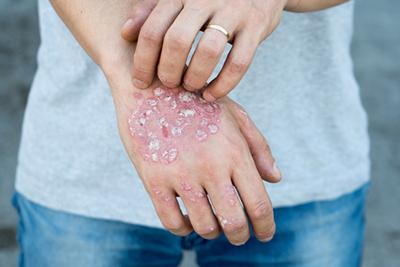The Connection Between Stress and Eczema Flare-Ups

- posted: Oct. 04, 2024
Eczema, also known as atopic dermatitis, is a chronic skin condition affecting millions worldwide. Characterized by red, inflamed, and itchy skin, eczema flare-ups can significantly impact quality of life. While environmental triggers like allergens, irritants, and dry skin are well-known causes of flare-ups, stress also plays a critical role in worsening eczema symptoms. Your dermatologists at Dermatology Associates Skin & Cancer Center in Panama City, FL, can explain how stress can trigger eczema and how to manage flare-ups.
Understanding the Connection Between Eczema and Stress
Eczema is a chronic inflammatory skin condition that results in dry, itchy patches of skin that can become red, swollen, and irritated. It typically appears in childhood but can affect individuals at any age. While the exact cause of eczema is not fully understood, it is believed to be related to a combination of genetic and environmental factors that affect the skin's barrier function and immune response. Talking to your dermatologist in Panama City, FL, about what may trigger your stress and how to manage the condition is important.
Common symptoms include:
- Itching
- Dry, scaly skin
- Red or inflamed patches
- Cracking of the skin
- Thickened skin
Stress is known to have a significant impact on eczema, often leading to or worsening flare-ups. When the body experiences stress, it releases hormones such as cortisol, which can have wide-ranging effects on the body, including the skin. Stress triggers the release of cortisol, a hormone that can suppress the immune system’s ability to regulate inflammation. In people with eczema, this can exacerbate the body’s inflammatory response, leading to flare-ups or worsening symptoms. Since eczema is a condition marked by chronic inflammation, any disruption to immune regulation can quickly lead to a reaction on the skin.
When under stress, the skin can become more sensitive to irritants. Stress weakens the skin's protective barrier, making it more susceptible to allergens, pollutants, and other environmental triggers. This makes it easier for eczema flare-ups to occur when the skin comes into contact with common irritants like soaps, fragrances, or fabrics.
Stress not only worsens the physical symptoms of eczema but also contributes to its psychological toll. Eczema can affect self-esteem and confidence, particularly if flare-ups occur in visible areas like the face, neck, or hands. The emotional strain of managing a chronic skin condition can increase stress, creating a feedback loop that exacerbates eczema symptoms.
Contact Our Dermatologists Today
Make sure you understand what exacerbates your eczema. Contact your dermatologists at Dermatology Associates Skin & Cancer Center in Panama City, FL, to learn about eczema. Call for more information and to schedule your appointment today at (850) 769-SKIN (7546).

- posted: Oct. 04, 2024
Eczema, also known as atopic dermatitis, is a chronic skin condition affecting millions worldwide. Characterized by red, inflamed, and itchy skin, eczema flare-ups can significantly impact quality of life. While environmental triggers like allergens, irritants, and dry skin are well-known causes of flare-ups, stress also plays a critical role in worsening eczema symptoms. Your dermatologists at Dermatology Associates Skin & Cancer Center in Panama City, FL, can explain how stress can trigger eczema and how to manage flare-ups.
Understanding the Connection Between Eczema and Stress
Eczema is a chronic inflammatory skin condition that results in dry, itchy patches of skin that can become red, swollen, and irritated. It typically appears in childhood but can affect individuals at any age. While the exact cause of eczema is not fully understood, it is believed to be related to a combination of genetic and environmental factors that affect the skin's barrier function and immune response. Talking to your dermatologist in Panama City, FL, about what may trigger your stress and how to manage the condition is important.
Common symptoms include:
- Itching
- Dry, scaly skin
- Red or inflamed patches
- Cracking of the skin
- Thickened skin
Stress is known to have a significant impact on eczema, often leading to or worsening flare-ups. When the body experiences stress, it releases hormones such as cortisol, which can have wide-ranging effects on the body, including the skin. Stress triggers the release of cortisol, a hormone that can suppress the immune system’s ability to regulate inflammation. In people with eczema, this can exacerbate the body’s inflammatory response, leading to flare-ups or worsening symptoms. Since eczema is a condition marked by chronic inflammation, any disruption to immune regulation can quickly lead to a reaction on the skin.
When under stress, the skin can become more sensitive to irritants. Stress weakens the skin's protective barrier, making it more susceptible to allergens, pollutants, and other environmental triggers. This makes it easier for eczema flare-ups to occur when the skin comes into contact with common irritants like soaps, fragrances, or fabrics.
Stress not only worsens the physical symptoms of eczema but also contributes to its psychological toll. Eczema can affect self-esteem and confidence, particularly if flare-ups occur in visible areas like the face, neck, or hands. The emotional strain of managing a chronic skin condition can increase stress, creating a feedback loop that exacerbates eczema symptoms.
Contact Our Dermatologists Today
Make sure you understand what exacerbates your eczema. Contact your dermatologists at Dermatology Associates Skin & Cancer Center in Panama City, FL, to learn about eczema. Call for more information and to schedule your appointment today at (850) 769-SKIN (7546).
Our Location
1900 Harrison Avenue,
Panama City, FL 32405
Office Hours
Monday
8:00 am - 5:00 pm
Tuesday
8:00 am - 5:00 pm
Wednesday
8:00 am - 5:00 pm
Thursday
8:00 am - 5:00 pm
Friday
8:00 am - 3:00 pm
Saturday
Closed
Sunday
Closed

